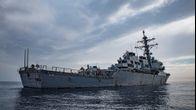
Houthis’ Escalating Threat to Shipping Lines Signals Red Sea Militarization
Fears among Yemenis are mounting over the militarization of the Red Sea as the French, US, and British navies join forces to counter Houthi attacks in one of the world’s most vital trade routes.
On Sunday, the French navy announced the destruction of two Houthi drones in the Red Sea that were heading towards the frigate “Languedoc” operating in the Red Sea.
“The interception and destruction of these two identified threats” were carried out late Saturday by the frigate Languedoc, which operates in the Red Sea, the general staff said in a press release.
Amid the Gaza conflict, the Houthi group saw an opportunity to divert attention from its internal crisis, recently escalating threats to target all international ships in the Red Sea heading to Israel.
The group, which the Yemeni government accuses of being an Iranian proxy, seized the Galaxy Leader vessel last month and transported it to the Hodeidah coast.
Yemeni politicians are skeptical about the effectiveness of the latest US sanctions.
They doubt Washington will engage in a decisive military confrontation with the group and are skeptical the Houthis would launch a significant attack that would pose a real threat to US or international forces in the Red Sea.
Washington recently announced sanctions against 13 individuals and entities. It accused them of providing tens of millions of dollars from the sale and shipment of Iranian goods to support the Houthis, with assistance from Iran’s al-Quds Force.
– Intervention serves Houthis
Yemeni journalist Abdullah al-Sunami believes that France’s involvement in the military action against the Houthis in the Red Sea could inadvertently benefit the group.
Sunami explained to Asharq Al-Awsat that defensive military actions in the Red Sea would further inflame the situation because any military operation in the international shipping lane affects it.
He noted that Houthis will then benefit from the situation and claim the West supports Israel.
According to the journalist, the gradual and successive Houthi escalation, including the announcement of targeting any ships to and from Israel, will usher the conflict in the region into a new phase, which is expected based on the geopolitical conflict history over Yemen’s geography.
The complexities of global events, such as the conflict in Ukraine, the situation in China, the US debt issue, and the conflict in Palestine, all hinder any effective action against the Houthis, said Sunami.
He believes the situation may remain as it is, which will not have a significant impact, as long as Bab al-Mandab is relatively far from the Houthis.
He does not rule out the possibility of a military conflict over Bab al-Mandab, a Houthi strategic target.
The conflict in Yemen is approaching the “important” stage of controlling the shipping lane in the Red Sea.
Sunami believes that peace efforts will be significantly affected by the events. However, given the intertwining of interests and goals, it is a false cover for what each party wants.
– International threat
Yemeni political analyst and journalist Ramah al-Jabri believes that the French presence in the Red Sea confirmed that the international community is sensing the danger of the Houthi group.
Jabri remarked that throughout the years of conflict in Yemen, particularly under the stewardship of UN Envoy Martin Griffiths and, subsequently, the Biden administration, the Houthis were afforded numerous incentives that fueled their ambitions for governance in Yemen.
He told Asharq Al-Awsat that it began with acknowledging them as a political entity and a de facto authority, along with the revocation of their classification as a terrorist organization.
The group enjoyed international leniency despite perpetrating ongoing war crimes and acts against humanity, he noted, adding that the clemency persists even as the group hinders global peace initiatives.
Jabri remarked that the international community will pay the price for its misguided policy in dealing with the Houthi group, and Yemenis will pay an additional price as the Yemeni coasts and territorial waters may become a battlefield for global conflict.
Jabri believes that if the Houthi threat becomes strong enough to endanger the interests of major countries, the international community will be forced to engage in a military operation in Yemen.
They could aim to liberate Hodeidah and the west coast up to the port of Midi in Hajjah to protect maritime navigation and international trade.
According to Jabri’s assessment, the scenario may not align with the current regional reluctance to return to war.
Yemeni parties may currently reach an agreement and a prolonged truce, which would primarily benefit the Houthis, said Jabri.
– Deterrent Measures
Yemen’s Undersecretary Minister of Information Fayyad al-Numan emphasized the need for deterrent measures against what he calls “Houthi terrorism,” threatening Yemen, the region, and the world.
Speaking to Asharq Al-Awsat, Numan called for adopting a system of deterrent measures by influential countries in the region.
Actions should not be limited to sanctions against Houthi figures and their supporters, he said, adding that the group should be stopped according to international law, preventing threats to national security and maritime navigation in the Red Sea.
Numan also called on concerned countries to counter the Houthi threat and boost international and regional cooperation to protect vital maritime routes from terrorist acts.
The Yemeni official noted that the Yemeni crisis is a significant card in the regional portfolio, and the Houthi practices have a substantial impact on efforts to revive the UN-sponsored peace process.
While Houthis may have ignited the Yemeni war, Numan asserted that they could not be a party in achieving a comprehensive peace.
Source: aawsat





